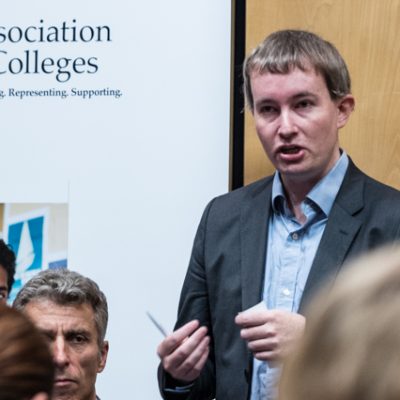Battling cuts to adult education has been the defining task for Stephen Evans at Learning and Work Institute, but money was no object when his career began at the Treasury under Gordon Brown, he tells Jessica Hill
Stephen Evans’ decade as chief executive of Learning and Work Institute (L&W) has been a fight against the relentless erosion of adult education sector funding.
When he joined L&W’s predecessor in 2014, £5.06 billion was spent on adult education. Last year, it was predicted to drop to £4.75 billion.
His career began at the Treasury tackling child poverty, but he says his proudest achievement is that L&W “still exists – and hopefully makes a difference”.
“It’s the small flashes of light I see happening across the country that give me glimmers of hope,” he tells me.

Becoming a leader
Evans’s self-deprecating manner endears him to those he works with. And it does not come at the expense of substance and authenticity.
But his appearance as a fresh-faced policy boffin with a prodigious intellect meant when he first took on the CEO role, some were unsure whether he had what it took to lead the organisation through the stormy waters ahead.
He was deputy chief executive of L&W’s predecessor, the National Institute of Adult Continuing Education (NIACE), when in 2015 financial concerns caused by government cutbacks sparked a merger with the Centre for Economic and Social Inclusion. Government grant money had dried up and staff headcount had plunged from 80 to 45.
After NIACE’s CEO David Hughes left to head the Association of Colleges, Evans took the helm with some trepidation.
“My first concern was, I’ve got 45 people’s livelihoods in my hands,” he recalls. “If I get it wrong, that affects their jobs. And this organisation had been around for almost 100 years – I didn’t want to be the one that crashed it.”
His strong moral compass comes from his Catholic upbringing (he was taught by nuns). Evans’s mum worked for the benefits agency and his dad for a local authority. “Both were very clear, you should use your talents to help others and tackle inequality and injustice,” he says.
Ironically, Leicester Royal Infirmary where he was born stands within sight of the office that L&W retains in Leicester. His East Midlands accent gets stronger when he’s back in his hometown.
But I meet Evans on the rooftop garden of L&W’s London office in Vauxhall, in a building which also houses charities such as the Prison Education Trust.
L&W’s new home beside Big Yellow Storage feels “much safer” than their previous address next door to MI5, where bomb threats were a regular occurrence. “We’d get blown up in every James Bond film”, he comments wryly.

A cloistered education
Evans never considered applying to Oxbridge until it was suggested to him by his business and economics teacher, who went on to tutor Evans for the challenge and “tried to persuade” his parents to swap their tabloid newspapers for broadsheets. Evans did not hold out much hope of success.
His “very intimidating” interview for a place at Queen’s College in Cambridge to study economics took place beside a log fire in a cloister, at a time when Evans “didn’t know what a cloister was”.
Many of his fellow students at Cambridge already knew one another from attending the same private school or playing lacrosse. Evans realised they were no cleverer than his former schoolmates but simply more privileged.
“It gave me a bit of a window on a world you don’t often see, then inspired me towards changing it,” he says.

Treasured times
Upon graduating, Evans was “chucked in at the deep end” as a policy advisor at the Treasury under Gordon Brown. On his first day he was sent to the Office for National Statistics to get advance copies of the labour market statistics and given just two hours to file a briefing for Brown on “what he should say about them”.
It was a golden age of flowing government coffers, and Evans and his team could pull numerous levers in the mission they were tasked with to eradicate child poverty.
Growing public services rather than dialling down spending provided Evans with plenty of job satisfaction.
His job was to get more lone parents into work through the national minimum wage, tax credits and employment support, and “invest in adult skills so people could improve their circumstances”.
He also worked in the Treasury’s productivity team (“like a think tank in the Treasury running projects”) where his brief included delving into the operation of ports and the pivotal 2006 Leitch review of skills.
This independent review, led by Lord Sandy Leitch, had similar aims to Skills England – “to identify the UK’s optimal skills mix… to maximise economic growth, productivity and social justice” and work out how to achieve it.
As a result of its recommendations, a quango, the UK Commission for Employment and Skills, was formed, and the statutory age at which young people could leave education was raised to 18.

Reviewing regrets
A target was set for all employers to commit to training all their workers to level 2, the equivalent of five GCSEs at A-C, by 2010. But the onus was placed on businesses to provide the plan.
The Treasury had wanted to go “further and faster” on skills. But it was a “political decision” to give employers “one last chance” to achieve the Leitch review’s goals through incentives. If that was not successful, a “levy and compulsion” would be the next step.
Unfortunately, the subsequent financial crisis and general election derailed these reforms. Evans now regrets they did not force employers to go further.
Boris’s gods
Evans then became chief economist for the Social Market Foundation, a think tank aligned with the Labour government’s priorities at the time, where he relished the opportunity to debate issues that had been off-limits as a civil servant.
A year later he returned to the policy driving seat as director of employment and skills at the now-defunct London Development Agency.
In London, the mayor and the Greater London Assembly were tasked with making local policy decisions, while the agency was beholden to the Department for Education. “We could do anything we wanted as long as the DfE agreed, which meant we could do whatever the DfE wanted,” recalls Evans.
Boris Johnson swept into office in 2008 as mayor armed with a list of 12 projects he wanted to achieve, all named after Greek and Roman gods. Project Oracle was the mission to build an evidence base and share best practices, and Evans was tasked with commissioning Project Daedalus to support young offenders.
“The Wikipedia hits in that office building went up significantly after Boris came in”, as Evans and his team tried to work out who these gods were. Daedalus had created the world’s first prison to imprison the Minotaur.
Evans took what he had learned at the Treasury about measuring funding outcomes to prove the impact of the £80 million he had to spend. He set about making it go further by cutting the number of projects supported and limiting them to longer-term initiatives with higher success rates.

Learning outcomes
But he concedes that for adult education, it is not always possible to quantify an intangible impact.
“The classic criticism of economists is that they know the price of everything and the value of nothing. I hope I don’t quite fall into that trap, but others will judge,” he says.
“Often, you’re not going to help people with multiple complex difficulties turn their lives around in six months. You need to work with them for years, and that’s where short-term funding doesn’t really help at all”.
He gives the example of the citizens curriculum, a programme piloted by L&W shortly after he took over, where adult learners co-design the curriculum content. Its evaluation focused on a range of targets, proving that participants were subsequently more likely to use preventive services than emergency ones, with less school truancy among children and fewer callouts for anti-social behaviour.
But having that focus on broader outcomes is “very difficult” in the world of public policy where – “to paraphrase the Lord of the Rings, it’s a risk of one scheme to end them all, as though just one project can solve the ills of the world. It can’t”.
While the projects saved money for the public purse, the challenge was that those savings were split between the NHS, the criminal justice service, DfE and the Department for Work and Pensions. “They didn’t all think, ‘well, let’s invest together, because we all care about these things’. That’s the nut we’re always trying to crack.”

Getting the nation learning
After two years as a director for training provider Working Links, he then became deputy CEO of NIACE at a time of acute funding pressures. Three-quarters of NIACE’s income came from a DfE grant.
He recalls how “all our eggs were in one basket, and the basket had a hole in the bottom”.
He and Hughes embarked on the merger with Inclusion, an employment-focused organisation which shared a similar social purpose, and L&W was born.
L&W has just launched the Get the Nation Learning campaign to champion lifelong learning, and the Festival of Learning, which it has run for over 30 years, has been rebranded as Get the Nation Learning to celebrate inspiring work in the adult learning sector.
A vital part of L&W’s role is also to “shine a light” on “the scale of the cuts” to adult education and skills, particularly when shiny new announcements such as the recent £600 million for construction training are made. “When you net that off against the reductions they haven’t announced to the adult skills budgets and the end of the Multiply programme, it’s not quite so rosy in the garden,” Evans says.
But the “flip side” of Evans’ basket – which he concedes still has a hole in its bottom – is that now he has “plates spinning everywhere” which he has to keep moving.
Evans is pragmatic that more government funding for adult education is unlikely to emerge in the short term so he is focusing efforts on getting employers – who are now investing 26 per cent less in training than they were in 2005 – to “step up”. It is “not right”, he believes, that graduates are three times more likely to get training at work than non-graduates.
Lately, Evans has been rereading his books about the history of skills policy in the UK to prepare for an L&W report showing how adult participation in FE has hit its lowest point since the aftermath of the Second World War.
The findings have prompted him to pause for reflection on how historically, adult education initiatives were often instigated by faith and community groups, and later by socially responsible employers such as Joseph Rowntree. “Fast forward to now, it’s always ‘what can the government do for us?’” he says. “We’ve lost that self-organising of employers and communities.”

Devo challenge
Evans would like to see regional mayors topping up adult education from their other budgets to “get political salience for adult education” but concedes that boosting adult education is not viewed as a vote-winning policy.
Seeing adult education being deprioritised by the government while employers spend less on it too has been “pretty frustrating” for Evans during his time as CEO.
Our time is up, and Evans bids me farewell. “It feels so weird, rabbiting on about myself. You’ve done well not to look bored,” he remarks in his typical self-effacing style. Not at all, I assure him – it’s been fascinating.







Your thoughts